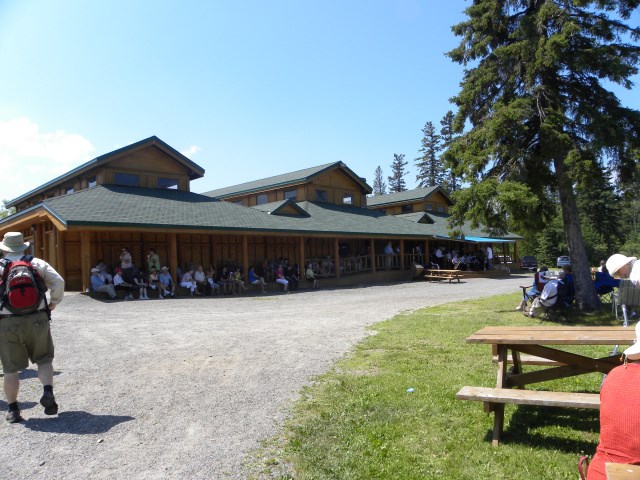THUNDER BAY — The chief of Fort William First Nation has questioned the City of Thunder Bay’s approach to Chippewa Park, saying the First Nation has potential outstanding claims to the land currently held by the city.
Chief Michele Solomon suggested those claims might explain the city’s reticence to invest in a roadway leading to the park that’s becoming notorious for its poor condition after years of neglect.
The Friends of Chippewa Park, a non-profit group that fundraises and advocates for the century-old attraction, raised the condition of City Road at a city council meeting on Monday.
The group presented a petition bearing about 1,400 signatures supporting a request to repair the road. They say the road’s “deplorable condition” has deteriorated to the point where it’s driving visitors away from the park.
The city says it has no plans to repair the road in the "next few years."
On Monday, staff said that’s because traffic volumes on the roadway place it far down the priority list for a limited roads budget.
Solomon sees a different explanation for the lack of maintenance on the road: the possibility it could be returned to the First Nation in the future.
“I anticipate that this land could form part of a land claim, in my mind at least,” she said in an interview. “I can only assume the city hasn't done anything with the road because they know that. Otherwise, why would you just stop taking care of the road?”
Solomon said she’s nonplussed the city has continued planning for the future of Chippewa Park without addressing the First Nation’s longstanding concerns.
“I think it disregards Fort William First Nation’s position and I think it disregards the history of what happened,” she said.
City manager Norm Gale did not answer questions on the status of discussions with the First Nation over its claims to the lands, or whether those claims have influenced the city’s decisions on whether to invest in the park and City Road.
In a statement, he said the city could not comment on legal matters.
"We know that Fort William First Nation lands issues are very important to Chief Solomon,” Gale wrote. “We have heard her concerns about lands, particularly Chippewa, and we have committed to address these issues.”
The statement did not clarify how the city plans to do that. Solomon said no discussions have taken place with the city on the issue since she was elected.
The last term of city council was divided on Chippewa Park’s future, with some councillors pointing to the First Nation’s concerns, and one going so far as to say the park sits on stolen land.
In an online history of Chippewa Park, the Friends group acknowledges the park was created “against the backdrop of [the] ongoing chipping away of the reserve’s territory.”
A small but important part of the park, containing the pavilion, rides area, and main beach, sits on reserve land expropriated by the federal government and given to the then-City of Fort William in 1905 to make way for a railway terminus.
That expropriation forced the community to abandon homes, churches, schools, farmland, and burial sites and relocate against its will.
The First Nation settled with the feds in 2016 over much of that expropriated land, not including the park, for $99 million.
The lands remain a point of contention between the city and the First Nation, however.
They were transferred to the Fort William First Nation Development Corporation by CN Rail following the federal settlement, but remain within the boundaries of the city.
Former Chief Peter Collins called on the city to repatriate the lands to his community in 2017, announcing the development corporation would no longer pay municipal taxes on them.
The taxation dispute appears to be ongoing.
A much larger portion of Chippewa Park was sold by the First Nation to the then-City of Fort William for $25,000 in 1917 via the Crown.
According to the Friends group, Fort William First Nation initiated a land claim over that area in 2000, but the claim was rejected by the federal government in 2008.
Solomon suggested there remain outstanding questions over the legitimacy of the 1917 sale, however.
During Monday’s council discussion, Coun. Kristen Oliver asked about the possibility of partnering with Fort William First Nation to repair City Road.
“I advise against involving Fort William First Nation at this time,” Gale responded, without elaborating.
Gale did not answer a question about that comment in his response to TBnewswatch.
In an interview, Oliver — whose Westfort ward includes Chippewa Park — said she couldn’t comment on how legal disputes between the city and First Nation have impacted discussions over the park.
She called the prospect of returning lands to the First Nation complicated, but expressed hopes the two communities could work together to preserve the park.
“I don't really know what the future of Chippewa entails,” she said. “There are some in the community who are saying the land should be returned back to Fort William First Nation.”
“Anyone that's been involved in property being returned back to a First Nation… it’s a very daunting process and it's not immediate. So at the end of the day, we still have this asset, and what are we going to do with it?”
“[In] conversations I've had with members of Fort William First Nation, they really value Chippewa Park… I think there's some opportunity that exists around how we continue to work collectively in the future.”
The Friends group has previously suggested a 168-acre section of the park south of Sandy Beach could be transferred to the First Nation as “compensation” for the 27.7 acres of the park that were expropriated in 1905.
The group noted in its presentation to council that three members of Fort William First Nation had recently joined its board.
Council ultimately referred the issue of road repairs to staff, seeking a report on less costly alternatives to a full reconstruction of the road by Jan. 22.
